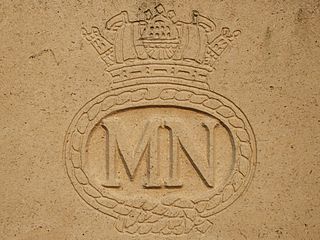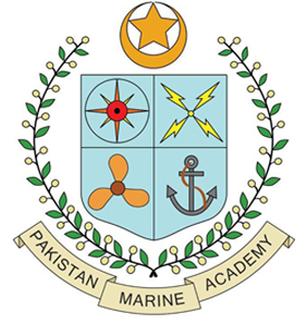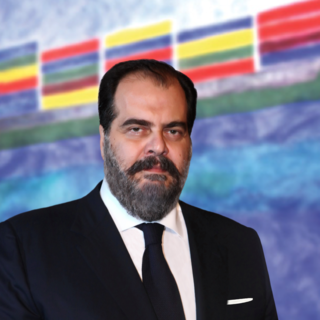
Maritime transport or more generally waterborne transport, is the transport of people (passengers) or goods (cargo) via waterways. Freight transport by sea has been widely used throughout recorded history. The advent of aviation has diminished the importance of sea travel for passengers, though it is still popular for short trips and pleasure cruises. Transport by water is cheaper than transport by air or ground, but significantly slower for longer distances. Maritime transport accounts for roughly 80% of international trade, according to UNCTAD in 2020.

The Confederate States Navy (CSN) was the naval branch of the Confederate States Armed Forces, established by an act of the Confederate States Congress on February 21, 1861. It was responsible for Confederate naval operations during the American Civil War against the United States's Union Navy.

The United States Merchant Marine is composed of United States civilian mariners and U.S. civilian and federally owned merchant vessels. Both the civilian mariners and the merchant vessels are managed by a combination of the government and private sectors, and engage in commerce or transportation of goods and services in and out of the navigable waters of the United States. The Merchant Marine primarily transports domestic and international cargo and passengers during peacetime, and operate and maintain deep-sea merchant ships, tugboats, towboats, ferries, dredges, excursion vessels, charter boats and other waterborne craft on the oceans, the Great Lakes, rivers, canals, harbors, and other waterways. In times of war, the Merchant Marine can be an auxiliary to the United States Navy, and can be called upon to deliver military personnel and materiel for the military.

The Merchant Navy is the maritime register of the United Kingdom and comprises the seagoing commercial interests of UK-registered ships and their crews. Merchant Navy vessels fly the Red Ensign and are regulated by the Maritime and Coastguard Agency (MCA). King George V bestowed the title of "Merchant Navy" on the British merchant shipping fleets following their service in the First World War; a number of other nations have since adopted the title. Previously it had been known as the Mercantile Marine or Merchant Service, although the term "Merchant Navy" was already informally used from the 19th century.
George P. Livanos was a Greek shipping magnate born in New Orleans, the son of Peter Livanos from Chios. He is often confused with his distant cousin, George S. Livanos, the sole son of Stavros G. Livanos, a legend in Greek shipping.

The Hellenic Coast Guard is the national coast guard of Greece. Like many other coast guards, it is a paramilitary organization that can support the Hellenic Navy in wartime, but resides under separate civilian control in times of peace. The officers and the enlisted members of Coast Guard are regarded as military personnel under Military's Penal Code. It was founded in 1919 by an Act of Parliament and the legal framework for its function was reformed in 1927. Its primary mission is the enforcement of Greek, European and International law in the maritime areas.

The rank insignia of the French Navy are worn on shoulder straps of shirts and white jackets, and on sleeves for navy jackets and mantels. Until 2005, only commissioned officers had an anchor on their insignia, but enlisted personnel are now receiving them as well. Although the names of the ranks for superior officers contain the word "Capitaine", the appropriate style to address them is "Commandant", "Capitaine" referring to "lieutenant de vaisseau", which is translated as lieutenant. The two highest ranks, Vice-amiral d'escadre and Amiral (Admiral), are functions, rather than ranks. They are assumed by officers ranking Vice-amiral (Vice-Admiral).
Seafaring is a tradition that encompasses a variety of professions and ranks. Each of these roles carries unique responsibilities that are integral to the successful operation of a seafaring vessel. A ship's crew can generally be divided into four main categories: the deck department, the engineering department, the steward's department, and other. The reasoning behind this is that a ship's bridge, filled with sophisticated navigational equipment, requires skills differing from those used on deck operations – such as berthing, cargo and/or military devices – which in turn requires skills different from those used in a ship's engine room and propulsion, and so on.

Pakistan Marine Academy (PMA) is located at Karachi, Sindh, Pakistan. It is a Seafarers Training Academy, working under Federal Ministry of Maritime Affairs, Government of Pakistan as an autonomous department. It is affiliated with NED University of Engineering and Technology and is also recognised by Higher Education Commission, Pakistan. Pakistan Marine academy covers an area of around 136 acres on the water front in Karachi Harbor, Hawksbay Road.

The United States Maritime Service (USMS) was established in 1938 under the provisions of the Merchant Marine Act of 1936 as voluntary training organization to train individuals to become officers and crewmembers on merchant ships that form the United States Merchant Marine per 46 U.S.C. § 51701. Heavily utilized during World War II, the USMS was largely dissolved in 1954, and its resources were absorbed into other federal departments. However, while the service is no longer structurally organized, remnants of the service still exist today and the service still actively commissions officers to function as administrators and instructors at the United States Merchant Marine Academy and the state maritime academies.

A sea captain, ship's captain, captain, master, or shipmaster, is a high-grade licensed mariner who holds ultimate command and responsibility of a merchant vessel. The captain is responsible for the safe and efficient operation of the ship, including its seaworthiness, safety and security, cargo operations, navigation, crew management, and legal compliance, and for the persons and cargo on board.

Nikolas D. Pateras is a seventh-generation Greek shipowner and founder of Contships Management Inc. He was born on August 26, 1963, in Athens, Greece, and is originally from the island of Oinousses. He has 3 children, Anastasia, Diamantis and John.
The Lemos family is a prominent Greek ship owning family which has been involved in shipping since the 18th century. They originated from Kardamyli in Mani as the 'Lemaki' family. During this period Turkish soldiers had violated many local villages and as a response members from the Lemaki family assassinated all of the Turkish troops stationed there. They emigrated to Chios and changed their names to Lemos during the journey to avoid detection. Having moved from Kardamyli and Langada in the Mani region they then named the areas in Chios "Kardamila" and "Lagada". From 1860 to 1914 the family owned 52 vessels.

Greece is a maritime nation by tradition, as shipping is arguably the oldest form of occupation of the Greeks and has been a key element of Greek economic activity since ancient times. Today, shipping is the country's most important industry worth $21.9 billion in 2018. If related businesses are added, the figure jumps to $23.7 billion, employs about 392,000 people, and shipping receipts are about 1/3 of the nation's trade deficit. In 2018, the Greek Merchant Navy controlled the world's largest merchant fleet, in terms of tonnage, with a total DWT of 834,649,089 tons and a fleet of 5,626 Greek-owned vessels, according to Lloyd's List. Greece is also ranked in the top for all kinds of ships, including first for tankers and bulk carriers.

Efthymios (Thimio) E. Mitropoulos was the seventh Secretary-General of the International Maritime Organization (IMO), a United Nations agency. Mitropoulos was elected as Secretary-General on 18 June 2003 during the 19th session of the International Maritime Organization Council. His four-year term started on 1 January 2004, and then was extended until 31 December 2011 by the IMO Council on 9 November 2006. He was succeeded by Koji Sekimizu.

The Pakistan National Shipping Corporation (PNSC) is a Pakistani national flag carrier and is one of Government of Pakistan's most profitable state-owned entities, most recently having recorded its highest ever profit under the chairmanship of Rizwan Ahmed. The corporation is principally engaged in the business of shipping, including charter of vessels, transportation of cargo and providing commercial, technical, administrative, financial and other services to its subsidiaries and third parties.

MS Europic Ferry was a roll-on/roll-off car ferry built in 1967 by Swan Hunter for the Atlantic Steam Navigation Company (ASN). She was acquired by European Ferries in 1971 when they took over the ASN and served with them under the Townsend Thoresen branding. The Europic Ferry was requisitioned by the British government in April 1982 and transported stores, equipment and troops to the South Atlantic during the Falklands War. After the war she returned to service with European Ferries until that company was sold to P&O in 1987. She was sold again to Namora Shipping in 1993 and served on routes in the Mediterranean until sold for scrapping in 2004.
The Union of Greek Shipowners is a trade association for Greek ship-owners.
SS Macedonia was a steamship that was built in England in 1912, renamed Pincio in 1922 and scrapped in Italy in 1932. She was built as an ocean liner for Greek owners, but within months of being completed she was converted into an armed merchant cruiser for the Royal Hellenic Navy. An Ottoman warship sank her in 1913 in the First Balkan War.
Nautical operations refers to the crew operation of a ship. It is the term used in academic education to refer to the studies of this professional field. Nautical operations refers to all the operational procedures, specific roles of officers and crew members, and regular functions and technical processes, which together shape the structure and functions for the general operations of a ship.






















